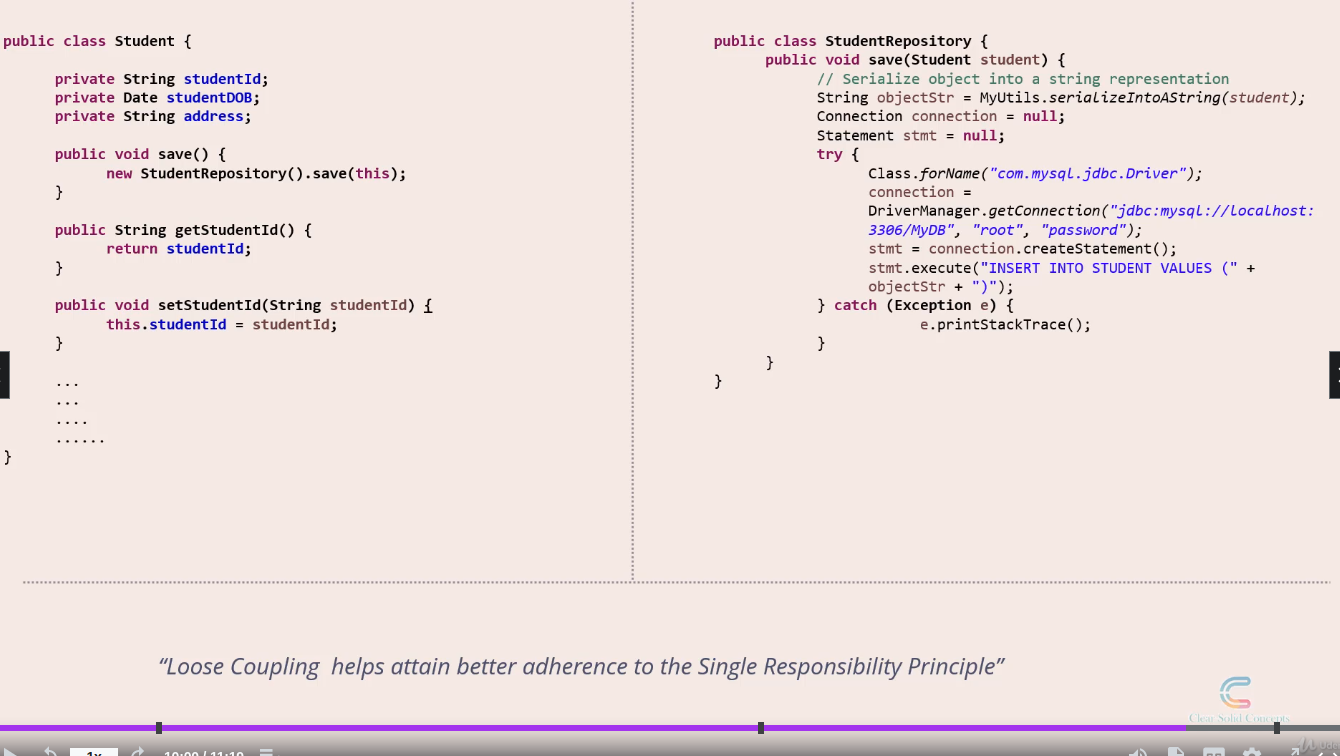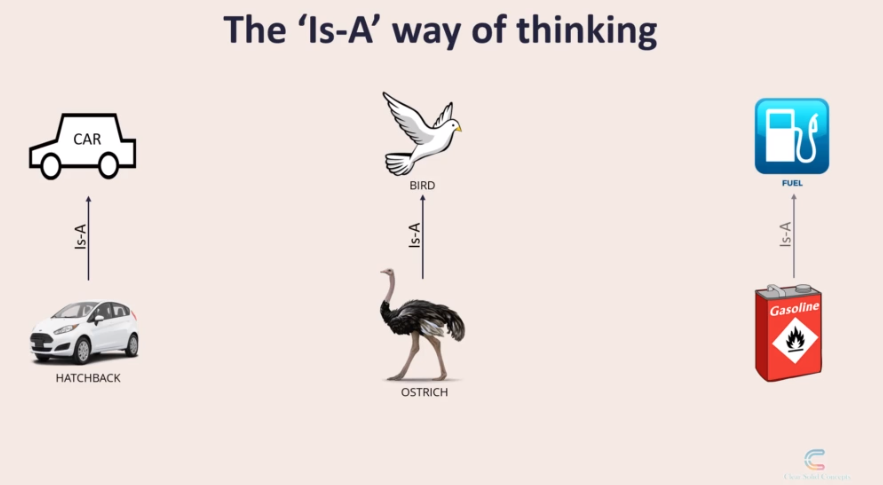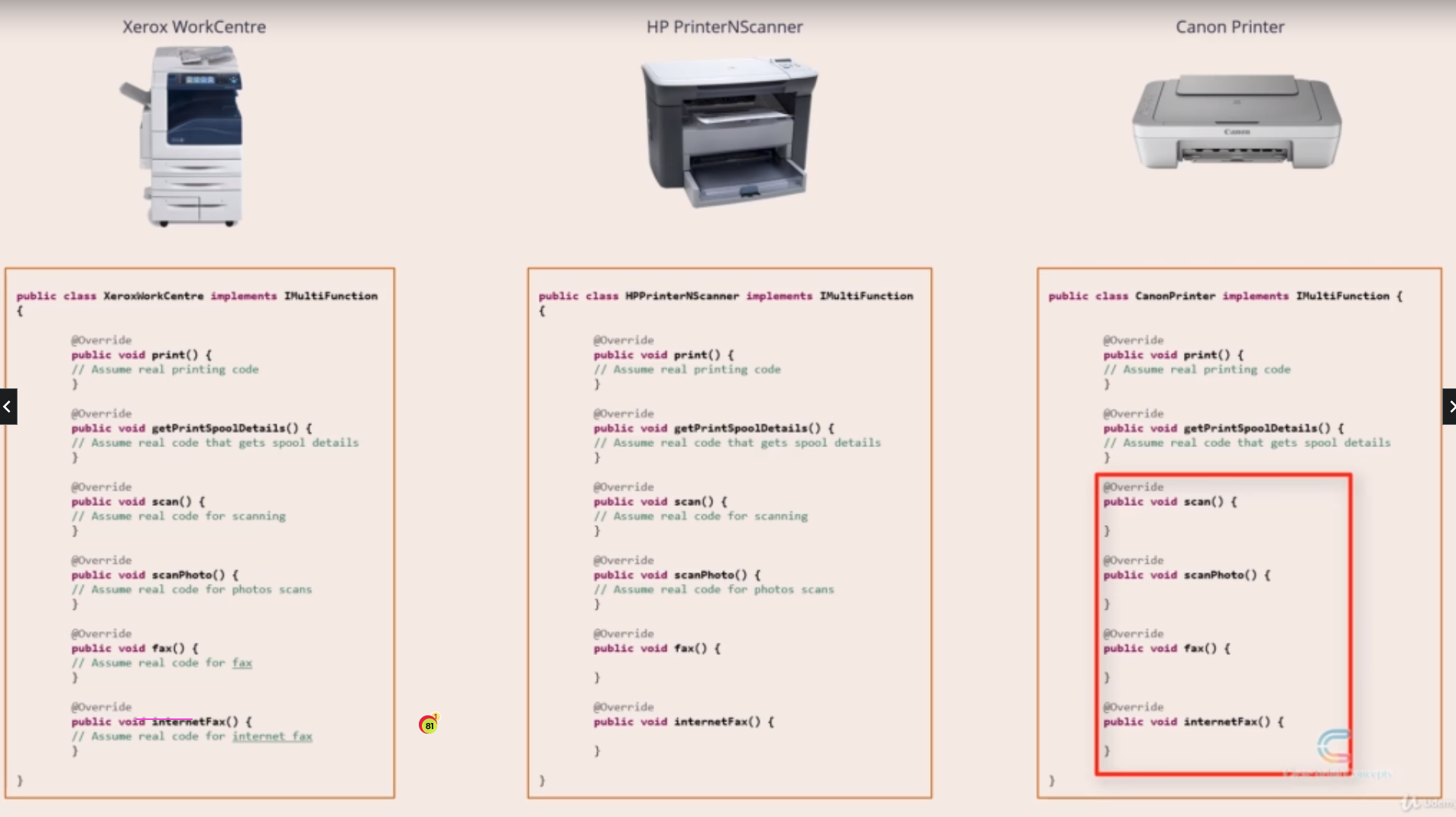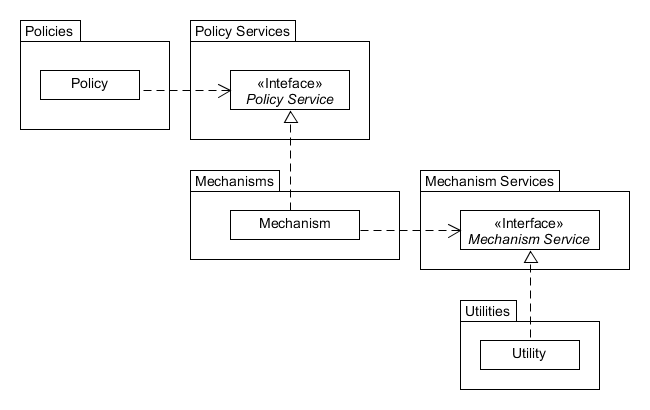SOLID principles, and SOLID in frameworks (part 1)
Solid principles contains five best praticles when construct source code by OOP methodology.
Single responsible principles
The single-responsibility principle (SRP) is a computer-programming principle that states that every module, class or function in a computer program should have responsibility over a single part of that program’s functionality, and it should encapsulate that part. All of that module, class or function’s services should be narrowly aligned with that responsibility. E.g: Defime module User manage user, define User class represent User in system, define Role class manage Role in System, define Permission class represent Permission in system, Policy class represent policy in system.
Every software component should have one and only one reponsiblity reason to change.
cohesion
Cohesion is the degree to which the various part of a software components related
Higher cohesion helps attain better adherence to the SRP. 
coupling
Coupling is defined as level of the inter dependency betweens various of software components.
Loose coupling helps attain better adherence to the SRP.
1
2
3
4
5
6
7
8
9
10
11
12
13
14
15
16
17
18
19
20
21
22
23
24
25
26
27
28
29
30
31
32
33
34
35
36
37
38
39
40
41
42
43
44
45
class Rectangle {
public $width;
public $height;
public function __construct($width, $height) {
$this->width = $width;
$this->height = $height;
}
}
class Square {
public $length;
public function __construct($length) {
$this->length = $length;
}
}
class AreaCalculator {
protected $shapes;
public function __construct($shapes = array()) {
$this->shapes = $shapes;
}
public function sum() {
$area = [];
foreach($this->shapes as $shape) {
if($shape instanceof Square) {
$area[] = pow($shape->length, 2);
} else if($shape instanceof Rectangle) {
$area[] = $shape->width * $shape->height;
}
}
return array_sum($area);
}
}
Open closed princliple
Software components should be closed for modification, but open for extension
- Closed for modification: New features getting added to sofrware component, should not have modify code
- Open for extensiion: A software should be extenable to add a new feature or to add a new behaviour to it. Eg: Define two class of Shape with attributes is closed for moification and the method is open for extendsion, example like we want calculator for area of rectangle.
1
2
3
4
5
6
7
8
9
10
11
12
13
14
15
16
17
18
19
20
21
22
23
24
25
26
27
28
29
30
31
32
33
34
35
36
37
38
39
40
41
42
43
44
45
46
interface Shape
{
/**
* Calculate the area of the shape.
*
* @return mixed
*/
public function getArea();
}
class Rectangle implements Shape
{
private $width;
private $height;
public function getArea()
{
return $this->width * $this->height;
}
}
class Circle implements Shape
{
private $radius;
private function getArea()
{
return pow($this->radius, 2) * PI;
}
}
/**
* Calculate the total area of the shapes.
*
* @param Illuminate\Support\Collection $shapes
* @return float
*/
public function Area($shapes)
{
$area = 0;
$shapes->each(function ($shape) use (&$area) {
$area += $shape->getArea();
});
return $area;
}
}
Good:
- Ease of adding new features
- Lead to minimal cost of developing and testing software
- requires decoupling, which in turn automatically foallows the SRP
Caution:
- Do not bindly, you will end up with a huge number of class that can complicated your overall design.
- Make a subjective, rather than an objective decision. The Open/Closed Principle is designed to make you write your code in such a manner that the core functionality is as unambiguous and concise as possible
Liskov subtitution priciple
Obejct should be replaceable with their subtypes without affecting the correctness of the program
1
2
3
4
5
6
7
8
9
10
11
12
13
14
15
16
17
18
19
abstract class Bird
{
abstract public function fly();
}
class Pengiue extends Bird {
public function fly()
{
return false;
}
}
class Eagle extends Bird {
public function fly()
{
return true
}
}
- break the hierachy
- Tell, don’t ask
Interface Segregation principle
No client should be forced to depend on methods it does not use
Techniques to identify violations of ISP
- Fat interfaces.
- Interface with low cohesion.
- Empty method implentations.
1
2
3
4
5
6
7
8
9
10
11
12
13
14
15
16
17
18
19
20
21
22
23
24
25
26
27
28
29
30
31
32
33
34
35
36
37
38
39
40
41
42
43
44
45
46
47
48
49
50
51
52
53
54
55
56
57
58
59
60
61
62
63
64
65
66
67
68
69
70
71
72
73
74
75
76
77
78
79
80
81
82
83
84
85
86
87
88
89
90
91
92
93
94
95
96
<?php
// Interface Segregation Principle Violation
interface Workable
{
public function canCode();
public function code();
public function test();
}
class Programmer implements Workable
{
public function canCode()
{
return true;
}
public function code()
{
return 'coding';
}
public function test()
{
return 'testing in localhost';
}
}
class Tester implements Workable
{
public function canCode()
{
return false;
}
public function code()
{
throw new Exception('Opps! I can not code');
}
public function test()
{
return 'testing in test server';
}
}
class ProjectManagement
{
public function processCode(Workable $member)
{
if ($member->canCode()) {
$member->code();
}
}
}
// Refactored
interface Codeable
{
public function code();
}
interface Testable
{
public function test();
}
class Programmer implements Codeable, Testable
{
public function code()
{
return 'coding';
}
public function test()
{
return 'testing in localhost';
}
}
class Tester implements Testable
{
public function test()
{
return 'testing in test server';
}
}
class ProjectManagement
{
public function processCode(Codeable $member)
{
$member->code();
}
}
Dependentcy Injection principle
High level module should not depend on low level module, Both should depend on abstrctions.
Abstraction should not depend on details. Details should depend on abstraction
Without dependency injection
1
2
3
4
5
6
7
8
9
10
11
12
13
14
15
16
17
18
19
20
21
22
23
class GoogleMaps
{
public function getCoordinatesFromAddress($address) {
// calls Google Maps webservice
}
}
class OpenStreetMap
{
public function getCoordinatesFromAddress($address) {
// calls OpenStreetMap webservice
}
}
class StoreService
{
public function getStoreCoordinates($store) {
$geolocationService = new GoogleMaps();
// or $geolocationService = GoogleMaps::getInstance() if you use singletons
return $geolocationService->getCoordinatesFromAddress($store->getAddress());
}
}
With dependency injection
1
2
3
4
5
6
7
8
9
10
11
12
13
14
15
16
17
18
19
class StoreService {
private $geolocationService;
public function __construct(GeolocationService $geolocationService) {
$this->geolocationService = $geolocationService;
}
public function getStoreCoordinates($store) {
return $this->geolocationService->getCoordinatesFromAddress($store->getAddress());
}
}
interface GeolocationService {
public function getCoordinatesFromAddress($address);
}
class GoogleMaps implements GeolocationService { ...
class OpenStreetMap implements GeolocationService { ...
Inversion of control
Inversion of control (IOC) defines the way objects are used, but it does not specify how to create them. IOC defines the relationship between the high-level class and detail class, where the high-level class depends on detail class. High- and low-level classes are related by abstracting a detail class in IOC.
1
2
3
4
5
6
7
8
9
10
11
12
13
14
15
16
17
18
19
20
21
22
23
24
25
26
27
28
29
30
31
32
33
34
35
36
37
38
39
40
41
42
43
44
45
46
47
48
49
50
<?php
//Define ClassA
class ClassA
{
public $ClassB;
public $ClassC;
public function ClassA()
{
echo "<h2 style='color:red'> Initialization of ClassA </h2>";
}
public function method()
{
$this->ClassB = new ClassB();
$this->ClassC = new ClassC();
$this->ClassB->method();
$this->ClassC->method();
}
}
//Define ClassB
class ClassB
{
public function ClassB()
{
echo "<h2 style='color:blue'> Initialization of ClassB </h2>";
}
public function method()
{
echo "<h3 style='color:blue'> The output from ClassB </h3>";
}
}
//Define ClassC
class ClassC
{
public function ClassC()
{
echo "<h2 style='color:green'> Initialization of ClassC </h2>";
}
public function method()
{
echo "<h3 style='color:green'> The output from ClassC </h3>";
}
}
//Create object of ClassA
$object = new ClassA();
//Call the method() function
$object->method();
?>
Totally
SOLID principles complement each other, and work together in unison, to achieve the common purpose of well-designed software






